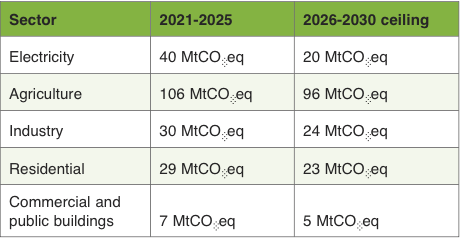CAP24: Setting out the decarbonisation of Ireland’s assets

The sectoral emissions ceilings included in Climate Action Plan 2024 (CAP24) outline the framework within which the decarbonisation of Ireland’s assets must take place, with the State targeting net zero by 2050.
The CAP24 sectoral ceilings, determined for different industries, serve as limits on the total amount of greenhouse gas (GHG) emissions each sector can produce over defined periods.
Understanding these ceilings and how they necessitate changes across the State’s economy is essential to understanding how the decarbonisation of Ireland’s assets will take place.
Sectoral emission ceilings
The 2023 and 2024 Climate Action Plan, under direction from the Climate Action and Low Carbon Development (Amendment) Act 2021, include carbon budgets for three distinct periods: 2021-2025, 2026-2030, and 2031-2035, aiming for significant annual reductions in GHG emissions across all sectors by 2030. Ireland seeks to achieve a net zero carbon economy by 2050, with interim targets playing a key role in reaching this target.
Each sector has specific emission ceilings based on these budgets, with the following notable examples for the 2021-2025 and 2026-2030 periods:
These ceilings aim to drastically reduce emissions in each sector, demanding deep decarbonisation strategies, transforming current practices, and deploying new technologies.
Electricity
The decarbonisation of electricity is foundational, as it underpins efforts in other sectors such as transport, industry, and heating. Ireland’s goal is to achieve 80 per cent renewable electricity by 2030, primarily through the expansion of wind, solar, and offshore renewable sources. Actions to decarbonise the electricity sector include:
• Expanding renewable generation: Ireland aims to have 9GW of onshore wind, 8GW of solar, and at least 5GW of offshore wind by 2030.
• Strengthening grid infrastructure: With increased renewable generation comes the need for a more robust and flexible electricity grid. Grid enhancements must focus on accommodating intermittent renewable energy sources.
• Demand-side flexibility: Encouraging consumers and large energy users to adopt smart technologies to adjust their energy use to match renewable supply will be crucial for balancing the grid.
Agriculture
As the largest emitter, the agriculture sector must reduce its GHG emissions by 25 per cent by 2030 compared to 2018 levels. Key strategies include:
• Improving efficiency: Technologies such as low-emission slurry spreading and protected urea fertilisers will reduce emissions from livestock and soil management.
• Land use and forestry: Shifting towards carbon sequestration practices in land use, such as reforestation and afforestation, will play a vital role in offsetting emissions from agriculture.
• Alternative livestock diets: Encouraging the use of methane inhibitors and developing alternative livestock feeding strategies can help to reduce methane emissions from cattle.
Industry
The broad industrial sector must reduce emissions by 35 per cent by 2030. Key decarbonisation actions include:
• Electrification: Shifting industrial energy use from fossil fuels to electricity, particularly in heat generation, is crucial. The electrification of manufacturing processes can significantly reduce reliance on natural gas and oil.
• Carbon capture and storage (CCS): Technologies that capture CO2 emissions at the source and store them underground are essential, particularly for industries where emissions are hard to abate, such as cement production.
• Hydrogen and biomass: Using hydrogen as a clean fuel for industrial processes, combined with the adoption of biomass where electrification is not feasible, will play a significant role.
Built environment (residential and commercial)
The built environment contributes over 11 per cent of Ireland’s emissions, and significant reductions are required. The sector needs to prioritise energy efficiency improvements and decarbonise heating. Key measures include:
• Retrofit programmes: Retrofitting homes and commercial buildings to higher energy efficiency standards will reduce energy demand. The goal is to retrofit 500,000 homes to a Building Energy Rating (BER) of B2 or better by 2030.
• Heat pumps: Heat pumps are a key technology for decarbonising residential and commercial heating systems. The target is to install heat pumps in 400,000 homes by 2030.
• District heating: Expanding district heating systems, particularly in urban areas, will help reduce reliance on individual fossil fuel boilers.
Transport
The transport sector accounted for 21.4 per cent of Ireland’s greenhouse gas emissions in 2023, according to the Environmental Protection Agency (EPA). The sector’s decarbonisation will require a shift away from private fossil-fuel cars towards electrified personal transport and expansion of public transport. Targets include:
• Electric vehicles (EVs): Government has outlined a target of one million electric vehicles on the road by 2030. This will require expanding the EV charging infrastructure.
• Public transport and active travel: While no specific broad sectoral reforms are outlined by government, Minister for Transport Eamon Ryan TD has stated that bus electrification, expanded rail networks, and expansion of cycling infrastructure are essential to encourage a shift away from car dependency. Some notable examples include the BusConnects and DART+ programmes, which aim to improve public transport offerings.
Analysis
CAP24 reemphasises the broad targets set out under the 2021 Act for decarbonising Ireland’s assets in each sector. While the plan sets out the broad decarbonisation targets for each sector, the means through which this will actually be achieved is dependent on innovation and leadership by sectoral leaders and decision-makers beyond political leadership.
For example, while the Government has taken measures to decarbonise the transport sector by increasing investment in public transport and expanding EV infrastructure, broad change will require bold decisions by private companies and state bodies to decarbonise their fleets and encourage new practices to decrease their carbon outputs, both at a broad institutional level, and by reducing the average carbon output of their employees.
This could take place through the continued use of work from home practices and remote working, something which Environment Minister Eamon Ryan TD has outlined is a key enabler to his vision of 15-minute towns and cities which can enable a reduction on reliance on private cars.






